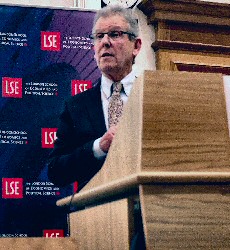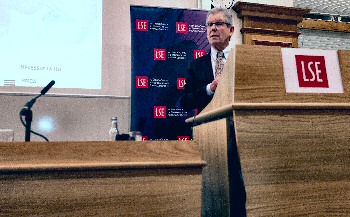|
IMPRESS want to redefine
journalism - Part 1.
Photos and report by Madeleine
Saghir

ON 20 January 2015, IMPRESS announced the
first members' names and made its charter submission, in its bid to be
recognised under a Royal Charter, at the London School of Economics and
Political Science. Madeleine Saghir attended this historic and very
important event for us. She has written this report about the organisation
and the event. We are also interested in your views on this very political
topic….
IMPRESS may become the first and only independent press regulator in the UK
and a bench mark for others to follow throughout the world. But what and who
is IMPRESS and why should our online newspaper join it?
According to the chairman of the association, Walter Merricks, IMPRESS aims
to be recognised as a "trusted mark in ethical journalism that attracts
innovative editors and reporters." IMPRESS want to raise the ethical
standards within journalism and to become the heart of a network for
publishers, journalists and academics.

The company calls for a reform of mediation for ethical issues involving
media reporting and complaints. In a press release following Lord Justice
Levenson's enquiry occasioned by the phone hacking scandals, IMPRESS stated
that it "would pursue its purpose through three core activities; complaints
handling, arbitration and investigations. It also publishes and promotes
research papers with analysis of relevant issues". There is a real need of
protection for publishers who cannot afford the high rates charged by IBSO
(International Business Standards Organisation). IMPRESS looks the most
promising organisation to tackle this matter.
There are a number of factors as to why press may face difficulties. There
is an everyday decline of people buying printed news, and an increase for
online sources; immediate information is changing all the time. This
immediate and constant information can be accessed digitally, which makes it
a challenging time for the press. The public do not directly pay for the
news they receive online. In fact, most of the money is going towards social
media platforms, and broadband. Merricks has said that the strategy of
IMPRESS, will be to work with hyperlocal and niche small organisations to
help them achieve the requite bench mark standard .
According to researchers (at Cardiff and Birmingham City University),
"There
are more than 400 active hyperlocal websites in the UK, compared with 1,045
local papers." And according to Merricks, 72% of hyperlocal publishers
support IMPRESS. These are the publishers that need protection from the
risks they encounter.
IMPRESS will be allowing small websites to sign up for a lower cost than
IBSO. Currently, IMPRESS is proposing to charge a modest £50 per year.
Many local newspapers, such as ourselves, are in favour of IMPRESS, due to
the need of a fairer arbitration service. The argument of who is to blame
when an incorrect statement has been made is an issue that IMPRESS has taken
into consideration. It is usually the publisher, rather than the reporter
who is liable in most IBSO cases. But, it can be both. However, IMPRESS will
change this process of publisher rather than reporter, in order to make a
fair trial.
.JPG)
It is also difficult to sue national papers due to high money costs.
However, suing a small paper costs a lot less. It is factors such as this
that make the idea of an independent press regulator useful in creating
greater equality between big and small publishers. Moreover, Merricks has
said that:- "Members of the public are not expected to have a court case in
order to obtain justice." IMPRESS will also not be awarding people
compensation.
However, a number of newspapers have concerns about these changes, and have
claimed that it cuts the right to freedom of speech and expression. Yet,
Merricks replied to these concerns by saying:- "We too stand for freedom of
expression, our doors and minds are open." ...Continued...
I
Continued on next page... Please click
here
now to read on... |
